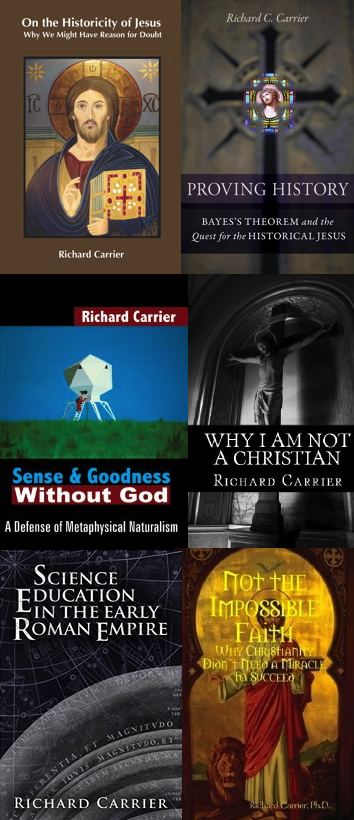My debate on the historicity of Jesus with atheist activist Jonathan Tweet is now available to view. I don’t find it very useful as debates go. Overall, we tried covering too many tangential things in too little time, and it became disorganized and hard to follow. And to make it worse, as time went on, Tweet increasingly obsessed over irrelevant fallacies—like his persistent argument that challenges to consensus and calls for methodological improvement are by definition arrogant, therefore always false—which led to nothing productive.
If I were to do a format like this again, I’d make it narrower, with very specific points to debate, in sections, one section per hyper-specific point (like, what Paul meant by “brothers of the Lord,” or whether there is any logically sound Argument from Embarrassment to a historical fact about Jesus in any of the Gospels), thereby avoiding accumulating digressions and distractions and creating more clear order for the audience to follow; and choosing for that format a short list of “most important” points (those that we would agree in advance are expected to move the probability the most depending on how we conclude on each); and then seeing how the conclusion moves on just those points (either increasing or decreasing the probability of a covering proposition, like “Jesus existed”). Rather than trying to resolve the entire debate all at once. Which is impossible. Because historicity rests on literally hundreds of assumptions. It’s simply not possible to cover them all in a timed debate.
Since I don’t think this debate was productive, I’m not going to bother analyzing it. There are several much better debates to watch (like Carrier-Crook; even Carrier-Evans and Carrier-Horn, for all their defects). Instead, I’ll just analyze Tweet’s own write-up on the debate.
Origins of What?
Tweet’s main complaint is that I was supposed to give an alternative theory of Christian origins, and didn’t. I actually did. The confusion is his: he has no coherent idea of what he means by an “account of the origins of Christianity.” He seems now to mean the origins of the emerging orthodoxy of the 4th century that engaged in near total document control thereafter. That’s a completely different debate.
That religion barely resembled even the sect of Paul, much less the “original sect,” which is what I take “the origins of Christianity” to refer to: origins meaning literally, “how and why the religion began.” And on that meaning, all mainstream scholars agree. Including Bart Ehrman. The development or evolution of the religion after its origin, is a completely different matter, involving a rather different system of hypotheses, which remain heavily debated even by historicists in the field.
In the debate I explained that the religion began with visions (as Paul repeatedly attests in his Epistles; indeed, in all his surviving 20,000 words, he references no other origin), after the first apostles read some cosmic events out of scripture (as again Paul repeatedly says). Then a lifetime later myths were constructed placing the demigod in earth history, just as was done for every other mystery religion (including Osiris cult in the neighboring province of Egypt). What happened after that is not an origin story. It’s a story about how the religion changed over time. Tweet seems consistently confused over the difference between those two things.
We have no other knowledge of what was happening in the religion in its first eighty years, or indeed even its first hundred years depending on how you date certain documents (like Ignatius and Papias, whose dates remain highly disputed even by mainstream scholars). That was by ancient standards not one but two average human lifetimes. A lot clearly happened in that period. But we aren’t allowed to see what. All we see is a very different religion emerge in the 2nd century than the one being preached by Paul in the early 1st. And yet an even more different religion centuries later.
The only surviving documents in that mini “dark age” in the history of the religion are either weirdly vague on historicity (like the Epistles in the NT; and 1 Clement: see Chapters 8.5 and 11 of On the Historicity of Jesus) or demonstrably fraudulent, e.g. neither the NT Gospels nor Acts can be validly defended as honest representations of anything that actually happened; have no credible sources; were composed when all witnesses appear to have been dead; and we aren’t allowed to see anyone’s critique of them there may ever have been (see Chapters 9 and 10 of On the Historicity of Jesus).
Hence the development of Christianity from its original form (which origin story I gave in the debate) into what one major strand of it had become a century later is not an origin story, but an evolution or development story. And that in turn is also a separate question from why the documents we have access to now, were curated a certain way (e.g. why we don’t get to see the original canon, the one assembled by Marcion; and don’t get to see the original letters of Paul; and don’t get to see any of the literature or correspondence of any of the parallel sects that then existed, like the one that authored the Ascension of Isaiah, or the one attacked by the forgery of 2 Peter), which curation happened many centuries later, by yet another version of the religion that differed considerably even from the early second century version it descended from.
In any event, all of this is covered in Chapters 3, 7, and 8 in On the Historicity of Jesus. Which is further informed by important background knowledge we need to be familiar with, all surveyed in Chapters 4 and 5 (for example, on the mini-dark age in our access to the literature: Chapter 4, Element 22; on Christianity being built from the start in the copycat framework of mystery cults: Chapter 4, Element 11; on much of the literature being fabricated like in all other religions of the time: Chapter 5, Elements 31 and 44; and so on). Those all cover how Christianity evolved from its origins, to something different, and then forgot (or erased) how it really began.
So what Christianity is Tweet trying to explain? Does he naively think Christianity was essentially the same religion across its first five centuries? We know for a fact that it was not. And again, that’s a mainstream conclusion. Every expert who isn’t a fundamentalist, agrees that’s the case. So we have to pick one, and debate that. You can’t debate every development in Christianity over 500 years in under two hours.
At best, we could have covered the question, “How did second century Christians forget or elide the original cosmic doctrine?” We could have made that one of the key sectioned points in this debate in prior planning. But Tweet never asked that. Not even during the debate. Not even now. It seems he lacks a coherent idea of what it is he thinks needs explaining. And accordingly, hasn’t checked my book for my explanation of it. And in result, didn’t ask about it. And consequently, it didn’t get debated. (I now cover that here.)
Pro tip: have a better grasp of the specific point you want debated; study in advance what your opponent already argues on that point; and articulate what you are seeking to understand or say about it.
Following Reason or Emotion?
A second and overlaying problem is Tweet’s inability to control his emotions and separate facts and logic from feelings. He “didn’t like,” for example, my exposing Bart Ehrman engaging in irrational arguments, and making false claims, and lying (Ehrman has done all those things, and I have carefully documented them, so you can see for yourself). Tweet’s emotional outrage prevented him actually asking himself if in fact the evidence indeed shows Ehrman did those things. Objectively, Tweet should be outraged at Ehrman. Not me. But the difference between reasoning from evidence and reasoning from emotion, is that the latter prevents you from rethinking your own assumptions.
Debating Methods or Conclusions?
A third problem is that when you compare Tweet’s excuses with what actually happened in the debate, Tweet is confusing a conclusion about what happened (the origins of Christianity) and the methods the field is using to determine that. In the debate, he confusingly disparaged as lone wolf, at one time, my work proposing advances in method in the field (the need of which is supported by every expert who has ever analyzed the methods the field is using: they have all concluded those methods don’t work and need revision; and my solution to that problem is supported by the latest peer reviewed philosophical work on the logic of historical method, and opposed by none), and, at another time, my proposal for rethinking the origins of Christianity. Which is not the same thing. Those are two separate debates.
Both are peer reviewed proposals scholars should be taking as seriously and debating as honestly as all the rest of their peer reviewed literature; that they are ignoring them (or, indeed, lying about them) is a mark against them, not me. All advances and paradigm shifts in history work this way: one person proposes, even radical, advances; scholars debate them; and a new consensus emerges. It seems clear Tweet would have desparaged Thomas Thompson with the same fallacies in the 1970s. Oblivious to the fact that Thompson was actually originating what would be the new consensus thirty years later, on the historicity of Moses and the Patriarchs.
It makes no sense to be “incredulous” that this is how the field works. And has always worked. It’s how every advance, every new paradigm, proceeds. Arguing “that can’t be” is so silly and amateur, it warrants a Luke Sywalker meme.
Fallacy of Argument from Prestige
Examples of Tweet’s emotion-based rather than evidence-based reasoning is clear in several sentences. For example:
Since no other historians have adopt[ed] Dr Carrier’s view [of the origins of Christianity], he is, by his own estimation, the world’s leading expert on Christian origins.
That’s not the correct metric for being a leading expert on the super-broad subject Tweet has in mind as “Christian origins.” Was Thomas Thompson the “world’s leading expert” on the entirety of the Bible and early Judaism when he published his peer reviewed challenge to the historicity of Moses and the Patriarchs in the 1970s? No. He was the world’s leading expert on only one narrow question: the historicity of Moses and the Patriarchs. It’s an objective fact that no one by that time knew as much or had yet published as in-depth an analysis of that question under peer review. He was in fact the world’s leading expert on that singular question. Because he put in the work. Everyone else was just resting on poorly examined assumptions. Assumptions he exposed as flawed.
And indeed, by that same metric, I am currently the world’s leading expert on the specific, hyper-narrow question of the arguments for and against the historicity of Jesus. No one has published as much or studied as much or knows as much on that singular topic. Because they just haven’t studied it as much (and their ignorance on so many facts pertaining to it evinces that point: again, just look at all the things Bart Ehrman gets wrong, from simply not bothering to check facts or seriously study the matter). No one has even published any peer reviewed study on it in a hundred years. That’s an objective fact. Not an opinion. It signals a serious defect in the field. But that defect could be redressed. By someone doing the work. That I’m the only one so far who has, is not a mark against me. It’s a mark against them.
But again, that’s a very narrow topic. There is a lot more to the whole broad span of early Christianity and its literature, especially in the sense Tweet means—which in his sense spans at least five centuries of Christian literature and development. Every historian in this field is more knowledgeable than me on something, if not indeed most things, that aren’t directly on the question of historicity. Indeed even most of what I base my own case on, comes from the greater expertise of other published authors, on other hyper-narrow questions that are not directly about that single question (like, for example, the authorship and redaction history of the Gospel of John; the dating of the Ignatian epistles; the dating and contents of the Ascension of Isaiah; and so on).
I should also point out, being the world’s most studied and published on a specific question in a field, does not guarantee you are right. Countless examples attest to this. This is as true of every other expert in the field, as of me. That’s why this debate should be about the evidence, and not any of this “argument from prestige” bullshit. Hence I have never used this (my singular expertise on this one hyper-specific question) as an argument for my being right. Tweet is the one obsessed with that fallacy. Not me.
Similarly, Tweet says:
If his hypothesis is right, he is the only historian who understands how Christianity really started and how the gospels were really written.
Actually, there are eight of us (and that’s not even counting Earl Doherty who actually discovered and first published this alternative theory, not me). So I’m not the only one. There are others I know who are unwilling to go on record, for fear of repercussions (having seen what happened to Thompson in the previous generation). We all agree there may be other correct theories of origins without Jesus than mine, and likewise other theories of Gospel development. Just as historicists agree there are multiple plausible theories of a historical Jesus, the defender of each being no more arrogant than any other in claiming to “know” the true one. There is no objective difference. I simply made the case for the theory I think is most likely, like every other expert has done. Under peer review. Like we are supposed to. Like all new theories are.
It’s now the responsibility of experts to take this new proposal seriously and debate it honestly. Just as they should have done (and eventually did) with Thompson’s parallel challenge to the consensus on Moses and the Patriarchs. And just as Goodacre did with Q. And so on. Which debate has to be on the facts and the logic. And not bullshit about “how dare you think you are smarter than all your peers,” which thinking is medieval, not scholarly.
Every change in historical theory came from some individual “daring to think they are smarter than all their peers” in Tweet’s sense; actually, just daring to notice things they didn’t, which is not the same thing as being “smarter,” whatever that means; it’s not even the same thing as “knowing more,” since one can know less, and still notice something in that less that everyone else missed. No field is credible, that does not allow single individuals to challenge its consensus. Because no field that condemns that, can ever correct itself and make any progress toward the truth. Tweet’s attitude is against the entire logic of modern evidence-based fields of knowledge. The very logic that separates it from medieval dogmatism. The irony is that his assuming the field should adopt his irrationality on this point, would actually refute his entire position: because the more the field acts like him, the less we have cause to trust any of its conclusions.
The field needs to not act like Tweet. Arguments from Prestige have to end. Logic and evidence must decide the truth. Nothing else.
Failing at Evidence and Logic
An example of why this is a serious problem is revealed by Tweet now saying (as if it was a point in his favor): “[Carrier] agrees with me that whoever is responsible for the Sermon on the Mount was a counterculture genius.” Tweet evidently glazed over when I explained that it’s a common mainstream conclusion that Jesus did not compose the Sermon on the Mount. My book cites the peer reviewed experts who agree on this point. So how does “whoever is responsible for the Sermon on the Mount was a counterculture genius” support the historicity of Jesus? When even mainstream scholars agree Jesus wasn’t responsible for the Sermon on the Mount, Tweet’s logic makes no sense.
Tweet thus ignores mainstream scholarship when it contradicts his assumptions (such as that only Jesus could have composed that Sermon, because only Jesus can have been a countercultural genius—a circular argument of appalling proportions). He relies on fallacies of reason (such as that only Jesus could have composed that Sermon, because only Jesus can have been a countercultural genius) and arrogantly claims to be smarter than all the actual experts who would correct him on that (OHJ, index, “Sermon on the Mount”; even Christian fundamentalists know the state of the field on this better than Tweet does, although of course they desperately try to argue against it). All the while complaining I’m the arrogant one. The one who actually spent over a decade earning a Ph.D. in a relevant field, and then engaged a six-year post-doc research project producing multiple peer reviewed books and articles on the subject. The one who actually checked, and relied upon, the peer reviewed literature on the composition of the Sermon on the Mount.
Similarly, Tweet wanted me to identify one mystery religion that was most similar to Christianity, at which I carefully pointed out that didn’t mean identical by any stretch. Answering his question, I named “the cult of Osiris as the cult most similar to the early Christian cult,” which Tweet says “is strange.” Tweet should know why it’s not strange. He is supposed to have read my peer reviewed book on this. Which explains exactly what similarities there are and aren’t. And cites primary evidence and peer reviewed scholarship on the point (OHJ, index, “Osiris”).
“Perhaps,” Tweet ponders, I was answering the question, “Which cult had a savior figure most like celestial Jesus?” because “the Osiris cult as a religious organization is hardly like the early Christian sect.” The fallacy here is confusing “most similar” with “totally identical.” There are a dozen similarities, far too many to be a chance coincidence. I enumerate them in On the Historicity of Jesus. There are also a hundred differences. Just as every other religion differs in a hundred ways from its ancestors and influencers. Mormonism differs from mainstream Christianity. Is it therefore not influenced by it and evolved from it? Christianity differs from Judaism. Is it therefore not influenced by it and evolved from it?
Tweet’s thinking here is illogical. It ranks similar to Christian apologetics. And yet again, he is supposed to have read my book. Where I refute this fallacy in detail (e.g. OHJ, author index, “Metzger”).
Christianity (in my model) most clearly resembles Osiris cult in its doctrine of double truth (fake earthly history, allegorically hiding a cosmic passion narrative), the role of a death-and-resurrection-emulating baptism, personal salvation thereby, its evangelism and fictive kinship structure, its adapting of a standard mystery religion template to local religious structures and ideas, and the role of a sacrificial dying-and-rising mediary demigod. And in other ways, but those were the most important to the debate.
Understanding Christianity is impossible, if you don’t understand how much it is ripping from surrounding mystery cults, changing the standard model up with imports from Judaism, just as every other national culture did. Which is what establishes it is not implausible that Christianity originated and developed the same way, including that double-truth system, of fake earthly biographies, hiding a “mystery” of a cosmic death and resurrection. Tweet kept acting incredulous at that. Yet he could never honestly say it was implausible to explain the Osiris cult that way. So why is it implausible to explain the Christian cult that way? A religion that arose directly adjacent to it, and emulated it in several conspicuous ways?
Tweet engaged other tactics similar to Christian apologetics, such as ridiculing the “cosmic sperm bank” model of prophecy fulfillment in the mythicist model I think most likely. Without ever explaining what that was, or any of the evidence and arguments my peer reviewed treatise presents for it, much less actually addressing any of those arguments (for a full account of that, see my article The Cosmic Seed of David). It’s particularly embarrassing for him to do that, because it’s such a minor point, which mythicism doesn’t even require. So to pick it out, and use it out of context that way, as if it were a scandal, is a questionable rhetorical tactic. Combining straw man with poisoning the well. Atheists should not be using fallacies to defend the historicity of Jesus. If the historicity of Jesus needs fallacies to defend it, we should just admit it’s indefensible.
Conclusion
Anyone keen on defending historicity needs to stop arguing from emotion and start arguing from evidence. They need to stop resorting to fallacies. They need to take seriously the peer reviewed challenge to the consensus, and make an honest effort to understand it, an effort not clouded by ignorance, emotion, and incredulity, but based on carefully paying attention to what is actually being argued, what it’s logic actually is, and what evidence its premises rest on.
For example:
- In what ways is Osiris cult similar to early Christianity? And what’s the best explanation of that fact? Don’t obsess on what ways they differ, turning that emotional obsession into a fallacious rationalization to ignore the implausibility of the similarities on any other theory but influence or shared models. Understand the actual relevance of the diffusion argument, and the abundant evidence for it. Understand why this informs us about what the earliest Christians were doing, and how the religion would likely evolve…the same ways all it’s parallel cults did.
- What did I say were the various possible ways Christianity evolved from the original version in Paul to the rather different version a century later? Tweet seems not to know. Despite claiming to have read my book, which answers that question. Don’t do that. Actually read what I say. Take it seriously. Actually try to understand it. Understand its logic. Understand the facts it’s built on. Understand the precedents I cite for it. And why they are relevant. You can’t rebut it, if you don’t. So do it.
- What are the actual precedents for cosmic sperm banks? What other explanations are there for Paul’s bizarre language (about God “bringing into being” the body of Jesus directly from David’s sperm, rather than Jesus being “descended” from David by being “born” to someone else)? Since there is more than one auxiliary theory that mythicism can rest on besides that; the cosmic sperm bank is only the most plausible. So what are those alternatives? Tweet seems not to know. Why do I think the sperm bank theory is the most plausible? Tweet seems not to know. All despite claiming to have read my book, which covers all this (OHJ, Chapter 11.9). Why does that particular auxiliary theory match Paul’s source’s wording exactly, in a way “descent” peculiarly does not? Why does Paul not say “descended” from David but “manufactured” from his “sperm”? And why were later Christians so worried about that, that they tried doctoring the manuscripts to have Paul not say that? These are questions we need to take seriously. Stop trying to sweep them under the rug. Don’t be Luke Skywalker. Pro tip: Darth Vader was his father. “That’s impossible”? Not a valid argument.
You can’t say something is implausible, if you can’t even be bothered to listen to detailed explanations of its plausibility in context. In the last case, for example, that includes its established precedents, its obvious grammatical logic in both Paul and his source, and its theological necessity even in a cosmic incarnation model, all covered in a recent peer reviewed book.
When an observation is necessarily the case on a hypothesis, it can never be evidence against that hypothesis. And the messiah being made from the sperm of David is necessarily the case on all hypotheses, because it was required by prophecy. Therefore it must be the case even on mythicism. And plenty of contemporary thought made that plausible. It’s being so can therefore never be evidence against mythicism. “That’s weird” is not an argument. Everything about Paul’s Christianity was weird. You need some other argument.
The bottom line is, if you refuse to even try to understand an argument you claim to be rebutting, you are wasting everyone’s time. Including your own.







I don’t understand the objections to the “Cosmic sperm bank” hypothesis. It seems everyone agrees that early Christians believed:
a) Jesus was of the seed of David, literally (as told by Paul):
b) Jesus was not conceived by the seed of Joseph, but by the Holy Ghost (Matthew, Luke).
Now, where would the Holy Ghost get David’s seed from, if not from some “cosmic sperm bank”? They might not like that term. And they may argue that the insemination could not possibly have happened anywhere but on Earth. I suppose they might think the Holy Ghost kept David’s sperm on Earth all that time, like Zoroaster’s sperm was supposed to be stored in a lake somewhere. But it just seems everyone is just freaking out on this issue rather than even trying to make some argument.
Would you clarify what is meant in the sixth paragraph by “after the first apostles read some cosmic events out of scripture”? I’m not wondering about which events are being referred to–but rather I would like to gain a better understanding of how the first apostles’ reading is related to Paul’s ideation of Jesus. Is it simply that it’s plausible Paul got the idea for a cosmic Jesus from the apostles?
Paul might deny it of course (that’s what he’s doing in Galatians 1), but almost certainly Paul learned the details from them through some channel or other (probably not directly; most likely from interrogating Christians he was persecuting). The cosmic model would certainly have been crafted (consciously or unconsciously) by Cephas (Peter) with perhaps influence from the other early leaders of whatever sect they were before this “revelation” sent them end-times-declaring.
How they did that is by pesher, a common practice in counter-cultural Jewish sects when Christianity began and a technique the first Christians were clearly using. We already see cosmic messianism being read out of scripture in the Qumran pesherim. Those documents may even come from the sect that later spawned Christianity. See OHJ, Ch. 4, Elements 5 through 9, and then 16 through 18; and with context in Ch. 5, Elements 23 through 29.
Much obliged, amigo. May you long continue wielding the sharp sword of TRVTH.
If mainstream scholars agree Jesus wasn’t responsible for crafting the “Sermon on the Mount” and that the woman caught in adultery was forged according to Ehrman, then what did Jesus actually do as a historical person?
There’s very little agreement among scholars as to how to answer that. One attempt, by The Jesus Seminar, came up with some sayings they believed really came from Jesus, and some deeds, but even their conclusions are subjective, and their aggregate report paves over the fact that there wasn’t in fact agreement on those things (every one likely had some dissenting voice; all they did was zero in on the few things that had the widest agreement).